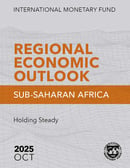This web page presents information about the work of the IMF in Gabon, including the activities of the IMF Resident Representative Office. Additional information can be found on the Gabon and IMF country page, including IMF reports and Executive Board documents that deal with Gabon.
At a Glance
News and Highlights
Gabon: The IMF Requires ”Transparency and Accountability in Public Resource Management”
Press Article from Gabon Media Time (in French)
August 3, 2020
Covid-19: The IMF Disburses FCFA 85 Million to Gabon
Press article from Gabon Review (in French)
August 1, 2020
Article from Gabon Media Time (in French)
November 11, 2019
Gabon: Encouraging Conclusions from the IMF
Article from Gabon Media Time
October 17, 2019
Gabon and the IMF
No results found. Either there was an error with the web service or there is no data returned by the web service.
Regional Economic Outlook
October 16, 2025

The outlook for Sub-Saharan Africa is showing resilience, despite a challenging external environment with uneven prospects in commodity prices, still tight borrowing conditions, and a deterioration of the global trade and aid landscape.
Read the Report
Fraudulent Scam Emails Using the Name of the IMF
For more information please see Fraudulent Scam Emails Using the Name of the IMF
Departmental Papers on Africa
 The Departmental African Paper Series covers research on sub-Saharan Africa conducted by International Monetary Fund (IMF) staff, particularly on issues of broad regional or cross-country interest. The views expressed in these papers are those of the author(s) and do not necessarily represent the views of the IMF, its Executive Board, or IMF Management.
The Departmental African Paper Series covers research on sub-Saharan Africa conducted by International Monetary Fund (IMF) staff, particularly on issues of broad regional or cross-country interest. The views expressed in these papers are those of the author(s) and do not necessarily represent the views of the IMF, its Executive Board, or IMF Management.



